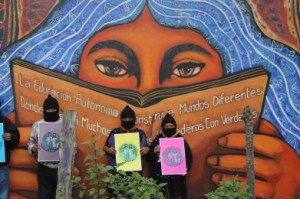 This weekend the Zapatista Good Government Boards turned ten. Throughout the five Caracols in the state of Chiapas, villages celebrated their continued existence and the gains made over a decade of indigenous autonomy and self-government.
This weekend the Zapatista Good Government Boards turned ten. Throughout the five Caracols in the state of Chiapas, villages celebrated their continued existence and the gains made over a decade of indigenous autonomy and self-government.
At the same time, hundreds of people are arriving from across the globe to participate in what the Zapatistas call “the little school”. According to organizers, 1,700 people from Mexico and abroad are registered to attend classes in San Cristobal de las Casas and the Zapatista communities.
“Classes” that, predictably, do not conform to the usual definition of classes. As Sub-Comandante Marcos explains in one of a series of comuniqués published before the event, “According to us Zapatistas, the place of teaching-learning, that is, the school, is the collective. The community. And the teachers are those who make up the collective. All of them. So there is no teacher, but rather a collective that teaches, that shows, that trains, and in it and with it the person learns, and at the same time, teaches.”
The participants will stay with indigenous families–part of learning is to go about their daily activities with them, to learn how they live and at the same time build up their autonomous communities. The subjects of the school are: freedom according to the Zapatistas, autonomous government I, autonomous resistence, participation of women in autonomous government and autonomous government II.
In the words of a message from the closely allied Network against Repression:
“At a decade (and counting) of daily construction, the Zapatista indigenous communities have forged an example of an “other way” to do politics. Its advances in education, health, women’s participation, caring for the earth, justice, democracy, self-government, just to mention a few, are an example worldwide… The rebel communities teach us that we don’t need bosses and we don’t need to ask permission to be free and take control of our lives in our own hands, eyes, breaths and hearts that are part of a collective.”
Over the past ten years, the Zapatista communities in resistance have faced attacks and hostility from government forces and paramilitaries as part of U.S.-backed counterinsurgency plans. They have suffered divisions and challenges. And yet they have maintained their communities and defended their autonomy.
Laura Carlsen is Director of the CIP Americas Program at www.americas.org
Photo: Desinformemonos



